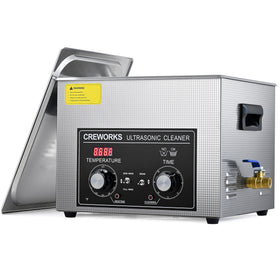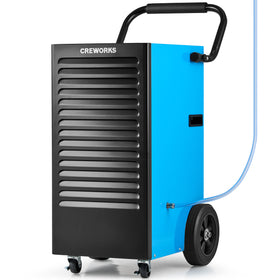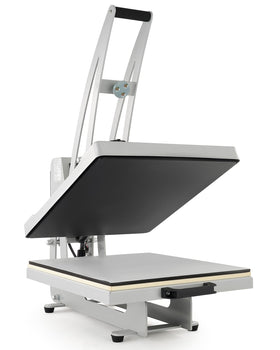With over 10000+ orders
With over 10000+ orders
In industrial settings, one of the biggest challenges is managing heat generated by heavy machinery. Excessive heat can cause damage, reduce efficiency, and lead to costly downtime. To prevent this, maintaining optimal temperatures is crucial, and that's where an industrial water chiller comes in.
A water chiller helps maintain a low temperature in your facility and cools the interior of machine equipment. Understanding the uses of industrial water chiller will allow you to make the best decisions for your machinery and other equipment. This blog will explain the importance of water chillers and their function in maintaining a smooth industrial workflow.

Water chillers are commonly used in industrial or commercial spaces. A chiller is a refrigeration system that cools liquid processes or mechanical equipment. The chiller's major duty is to remove unwanted heat while keeping a consistent temperature, current, and pressure in the machine or manufacturing process. This is accomplished when the heat-absorbing process circulates with the refrigeration cycle within a chiller.
Industrial chillers are used to manage the cooling (direct or indirect) of mechanisms, products, and machinery in a wide range of industries. Although there are several types of industrial chillers, they all employ air or water to cool.
For example, an air-cooled chiller uses fans to cool the chiller system, whereas a water-cooled chiller uses circulating water from the cooling tower. These chiller systems are capable of cooling water to extremely low temperatures, even zero.
In food industries, industrial chillers are used to cool food items so that they can be stored at a safe temperature until they are ready for packaging or sale.
Industrial chillers are also commonly used for refrigeration purposes. They are used to maintain a steady temperature in warehouses, factories, and other facilities, which varies according to the business.
In addition to chilling areas, industrial chillers can provide air conditioning by circulating cooled water via coils in an air handler unit.
Industrial chillers are also used as a means of heat transfer, circulating heated water via coils inside an industrial chiller unit before transferring it to another tank or enclosed space.
They have a wide range of uses, each with its own set of needs. When choosing a chiller, the most significant things to consider are the amount of chilling required, the length of time required, and the amount of energy required to operate the unit.

As we spoke about earlier, some industrial facilities produce a lot of heat energy as a byproduct of their activities. Cooling systems are essential for the thermal fluctuations to effectively disperse heat.
Industrial water chillers are a low-cost and effective cooling solution for a variety of industrial applications. A correctly sized water-cooled chiller system is a valuable asset to any industry aiming to increase production while reducing equipment downtime. The primary benefits of using a water cooling system are summarized here.
Water chiller-enabled processes are an efficient solution for a variety of reasons. To begin, water chillers function independently of ambient environmental temperatures, which allows them to avoid system inefficiencies caused by swings in ambient thermal conditions. Furthermore, due to its operating concept (using water to remove heat from a system), water chillers are extremely successful at rapidly decreasing temperatures in big industrial applications.
One of the advantages of using a water chiller is a better ROI. At the same time, the initial installation and start-up expenses may be high. Once the water chiller system is operational, it is a good long-term investment with little maintenance and component replacement.
These chillers are built to dramatically reduce energy expenses. In comparison to other options, the coolant utilized in these chillers (water) is abundant, inexpensive, and easy to get. Furthermore, water is a great conductor for transferring heat energy. Therefore, it will quickly disperse the heat contained in an associated operation while using less energy.

Manufacturers often design water chiller systems to survive for a long time. Thus, water chillers outperform conventional cooling systems in terms of durability and lifespan.
The reason for this is pretty simple. The majority of the components in water-cooled chiller systems are internal, with just a few exposed to natural weather factors (rain, wind, sunshine, ice).
Water chillers can speed up production by optimizing temperatures during processes. Maximum efficiency is achieved under well-regulated temperature conditions, and water-cooled chillers can provide a steady process environment. Furthermore, water chiller systems minimize damage to heat-sensitive industrial components, avoiding costly maintenance downtime that can slow down or even halt production.
If your plant, facility, or machinery is facing issues related to overheating, Creworks offers the ultimate solution to your problems. I recommend their 5-TON AIR-COOLED INDUSTRIAL WATER CHILLER, which caters to various applications, from welding machines and laser engravers to different industrial equipment. It comes with a built-in cooling fan, smart control panel, pressure gauges, and much more.
Now that you know the uses of industrial water chiller, you understand that heat generation is a machine killer. In simple words, if your machine is producing too much heat, it is a sign to make changes or replace it. Investing in industrial water chillers is crucial to the optimal functioning of any industry. It helps keep your workflow smooth and running without the problems that come with overheating.












Leave a comment